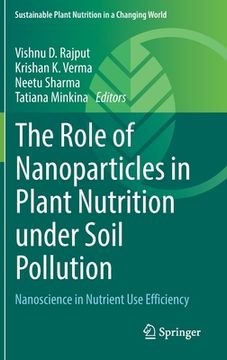Share
The Role of Nanoparticles in Plant Nutrition Under Soil Pollution: Nanoscience in Nutrient Use Efficiency
Rajput, Vishnu D. ; Verma, Krishan K. ; Sharma, Neetu (Author)
·
Springer
· Hardcover
The Role of Nanoparticles in Plant Nutrition Under Soil Pollution: Nanoscience in Nutrient Use Efficiency - Rajput, Vishnu D. ; Verma, Krishan K. ; Sharma, Neetu
Choose the list to add your product or create one New List
✓ Product added successfully to the Wishlist.
Go to My Wishlists
Origin: U.S.A.
(Import costs included in the price)
It will be shipped from our warehouse between
Tuesday, July 02 and
Monday, July 15.
You will receive it anywhere in United Kingdom between 1 and 3 business days after shipment.
Synopsis "The Role of Nanoparticles in Plant Nutrition Under Soil Pollution: Nanoscience in Nutrient Use Efficiency"
Nanotechnology has shown great potential in all spheres of life. With the increasing pressure to meet the food demands of rapidly increasing population, thus, novel innovation and research are required in agriculture. The principles of nanotechnology can be implemented to meet the challenges faced by agricultural demands. Major challenges include the loss of nutrients in the soil and nutrient-deficient plants, which result in a lower crop yield and quality. Subsequently, consumption of such crops leads to malnourishment in humans, especially in underprivileged and rural populations. One convenient approach to tackle nutrient deficiency in plants is via the use of fertilizers; however, this method suffers from lower uptake efficiency in plants. Another approach to combat nutrient deficiency in humans is via the use of supplements and diet modifications; however, these approaches are less affordably viable in economically challenged communities and in rural areas. Therefore, the use of nano-fertilizers to combat this problem holds the greatest potential. Additionally, nanotechnology can be used to meet other challenges in agriculture including enhancing crop yield, protection from insect pests and animals, and by use of nano-pesticides and nano-biosensors to carry out the remediation of polluted soils. The future use of nanomaterials in soil ecosystems will be influenced by their capability to interact with soil constituents and the route of nanoparticles into the environment includes both natural and anthropogenic sources. The last decade has provided increasing research on the impact and use of nanoparticles in plants, animals, microbes, and soils, and yet these studies often lacked data involving the impact of nanoparticles on biotic and abiotic stress factors. This book provides significant recent research on the use of nano-fertilizers, which can have a major impact on components of an ecosystem. This work should provide a basis to further study these potential key areas in order to achieve sustainable and safe application of nanoparticles in agriculture.

